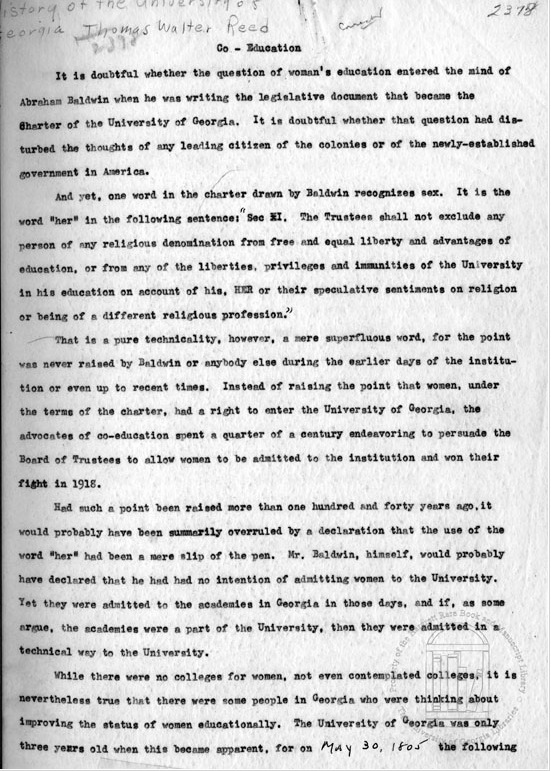Co-Education Records
Admitting women into the University of Georgia was a long and laborious battle. The entirety of this process was recorded by Thomas Walter Reed, the registrar of the University from 1909-1945. In his book titled History of the University of Georgia, he dedicated an entire section of a chapter to the co-education of the University. Thomas Reed opened this chapter with an ironic circumstance that could have possibly cleared up the debate on co-education at the University of Georgia. While Reed was looking back at the original charter of the school, he noticed that Abraham Baldwin included the pronoun “her” in the charter, indicating that women technically had the right to be admitted into University of Georgia (Reed 2378). Unfortunately, no one ever looked back at the charter during this movement, and if they had, Reed assumed that they would have interpreted it as a grammatical error. According to Reed, the fight for co-education began in 1889 when the Daughters of the American Revolution proposed the admission of women to the Board of Trustees. The Board quickly denied the proposal, and no progress was made until women began attending summer sessions at the University with the help of Chancellor Walter B Hill in 1903 (Hale). Following this triumph, the fight for co-education slowed down with the death of Hill in 1905. It was not until World War I began that women had a genuine chance of being admitted into the University. Dr. Thomas Woofter fought for co-education by claiming, “we may expect that the conditions after the war will tend towards the higher percentage of women [becoming educators] and the demand for men in other lines of endeavor” (Reed 2389). Between him advocating for women to be admitted into the Peabody School of Education and Dr. Andrew Soule advocating for women to be admitted into the Division of Home Economics, the Board of Trustees finally allowed junior and senior women to be admitted to the University of Georgia. Soon after admitting women who were upperclassmen, they erected the first women’s dormitory on campus in 1920, and it was named Soule Hall after Dr. Andrew Soule (Hale). This dormitory was only open to women who were at least juniors in their college career because underclassmen were forced to attend a school outside of the main campus. Even though it took almost a quarter of a century to integrate women into the school, it was a tremendous step towards the future for the University of Georgia.
Sources
Hale, Aaron. “Opening a door: 100 years of women at UGA.” UGA Today, 17 Sept. 2018,
https://news.uga.edu/opening-a-door-100-years-of-women-at-uga/. Accessed 28 Oct. 2018.
Reed, Thomas. History of the University of Georgia. Hargrett Rare Book and Manuscript Library, as
presented in the Digital Library of Georgia.

